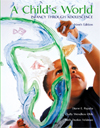 A Child's World: Infancy through Adolescence, 9/e Diane E. Papalia,
University of Wisconsin-Madison
Sally Wendkos Olds
Ruth Duskin Feldman
Cognitive Development in Early Childhood
Chapter Outline
Section I Piagetian Approach: The Preoperational Child
Advances in Preoperational ThoughtThe Symbolic FunctionEarly Symbolic Development and Spatial ThinkingCausalityUnderstanding of Identities and CategorizationNumber
Immature Aspects of Preoperational ThoughtConservationEgocentrism
Do Young Children Have Theories of Mind?Knowledge about ThinkingSocial CognitionFalse Beliefs and DeceptionDistinguishing between Appearance and RealityDistinguishing between Fantasy and RealityInfluences on Theory-of-Mind Development |
 |  |  | Section II Language Development
Vocabulary
Grammar and Syntax
Pragmatics and Social Speech
Private Speech
Delayed Language Development
Social Interaction and Preparation for Literacy |
 |  |  | Section III Information-Processing Approach: Memory Development
Recognition and Recall
Forming Childhood Memories
Influences on Autobiographical Memory
Implicit Memory |
 |  |  | Section IV Intelligence: Psychometric and Vygotskian Approaches
Traditional Psychometric Measures
Influences on Measured IntelligenceTemperament and Parent-Child InteractionThe Family Environment
Testing and Teaching Based on Vygotsky's Theory |
 |  |  | Section V Early Childhood Education
Goals and Types of Preschools: A Cross-Cultural View
Compensatory Preschool Programs
The Transition to Kindergarten |
| 


 2002 McGraw-Hill Higher Education
2002 McGraw-Hill Higher Education